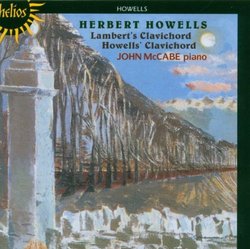| All Artists: Herbert Howells, John McCabe Title: Herbert Howells: Lambert's Clavichord; Howells' Clavichord Members Wishing: 0 Total Copies: 0 Label: Hyperion UK Original Release Date: 1/1/2005 Re-Release Date: 9/13/2005 Album Type: Import Genre: Classical Styles: Chamber Music, Historical Periods, Classical (c.1770-1830) Number of Discs: 1 SwapaCD Credits: 1 UPC: 034571151526 |
Search - Herbert Howells, John McCabe :: Herbert Howells: Lambert's Clavichord; Howells' Clavichord
 | Herbert Howells, John McCabe Herbert Howells: Lambert's Clavichord; Howells' Clavichord Genre: Classical
|
Larger Image |
CD Details |
CD ReviewsMcCABE'S PIANO DAVID BRYSON | Glossop Derbyshire England | 03/13/2007 (3 out of 5 stars) "My disc-collection contains a reasonable amount of early British (not just English - Kinloch is worth knowing) keyboard music, but very little of it is played on the clavichord. I knew indeed that this disc was not going to contain early music, but my glance at the frontispiece in a catalogue must have been too cursory because I got it expecting to hear a clavichord. Never mind. The mistake was entirely my own fault, and in any case it is a rigid article of faith with me that music is not there for instruments but instruments for music. I also happen to own some early English works exquisitely played on the piano by Gould, so I started with an open mind to that extent.
Howells is not simply pastiching a style from centuries ago, but attempting to write 20th-century music inspired by that style. There are three books of short pieces here, the first explicitly stated as `for clavichord', the other two (sharing a general title) described as `for clavichord or piano'. The latter pair came about through his becoming acquainted with a different clavichord from the instrument that drew the first book of pieces from him. They are a little more ambitious in idiom, but they keep within the 4-octave compass of a clavichord (as they would have to), and the piano that McCabe uses is not some 8-foot or 9-foot behemoth. Both the writer of the liner-note and Sir Richard Terry, whom he quotes, tell us in a rather peremptory way what we are to think of and admire in the music, and the liner-note writer also mentions `judicious use of the sustaining pedal'. This is where I start to have some problems. I would not necessarily have expected McCabe to play in the manner of Gould, but he uses the sustaining pedal a good deal too much for my liking. The sustaining pedal is an amateurs' standby, and in an age of piano professionals like the present overuse of it helps create a general impression that McCabe is more a talented amateur than a genuine professional. I felt this particularly in the first suite. McCabe starts Sargent's Fantastic Sprite quite well, but he seems to be struggling to fit the ornamentation into the rhythm as the piece progresses; and the rapid passagework in Samuel's Air sounds a bit laboured to me. It's only fair to say that I thought matters improved in the later suites. The sustaining pedal is more appropriate in many of these numbers, and McCabe gives the final Walton's Toye with a pleasant sense of abandon that I wish he had achieved earlier. Moreover he plays throughout with what I take for a true sense of the idiom and style of the works, and there is real depth and expressiveness in some of the more soulful specimens such as Finzi's Rest and Malcolm's Vision. The recording, from 2005, is perfectly satisfactory, and I should think so too at that date. The music being comparatively unfamiliar, I suppose I ought to risk a few opinions about it as well. Terry makes rather an issue of the fact that the style is not just derivative, but in my opinion we are entitled to expect that. However a style based so deeply in a bygone era gives me the sort of difficulty I have with the heavy dependence of much English music on folk-song - it leaves me uncomfortably aware of a lack of genuine primary inspiration. A great composer like Britten can hark back to folk-music, Purcell etc in a totally convincing way because he is a great composer: it's the rest of them I have the problem with. English music majors in byways, I fear, and this seems to me just another byway, although a very pleasant one. The liner-note fills in the background for us quite adequately, and lists the parties whose names are used, Enigma-Variations-style, in the various pieces. The only one I was left uncertain about was the eponymous hero of Hughes's Ballet - there must have been more than one Irish composer and critic called Hughes, surely? Otherwise my only regret was at not being told what Foss's Dump might be. I am pleased to own the disc, and any limitations I seem to detect in it are themselves subject to the limitations of one listener's perceptions. The star-rating that I have given relates only to the playing and does not reflect my views on the music. However it would not have been any different if it had done." |

 Track Listings (32) - Disc #1
Track Listings (32) - Disc #1